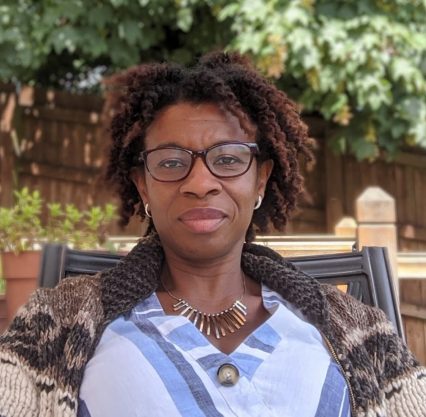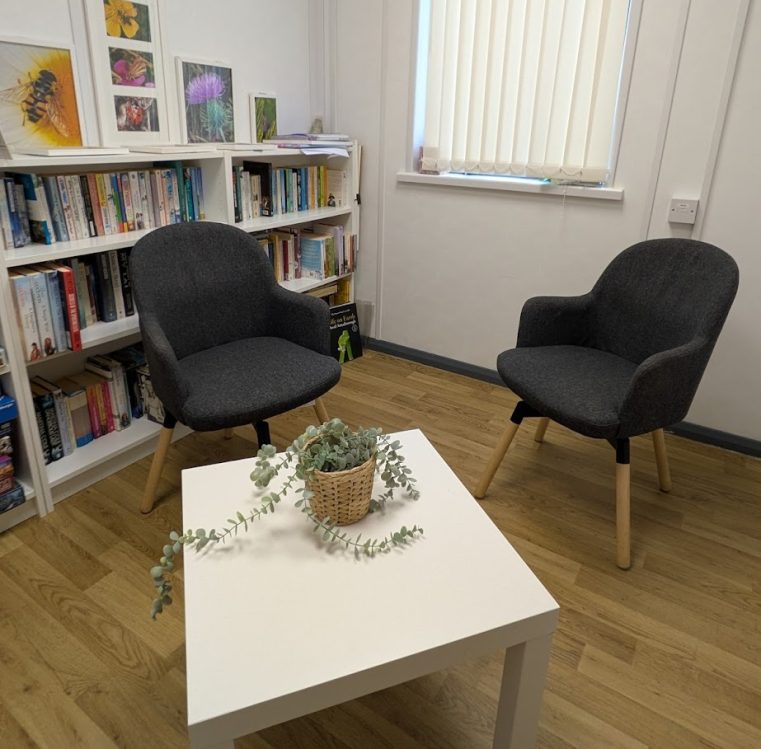Counselling and yoga in a safe and private setting
Are you feeling stressed and run down? Maybe you’ve experienced a life change or can’t stop feeling anxious. Whatever challenges and difficulties you face, I will work closely with you, guiding you through practices and techniques, so that you connect to the essence of yourself and lead a more fulfilling, enjoyable life.
Our work together, whether using counselling skills or yoga techniques, can be combined into physical practices and mindfulness-based interventions. Using a person-centred approach in counselling, we explore the issues that impact on your daily life. We reflect on difficult feelings and emotions in an empathic, safe space for you to nurture self-awareness and improve wellbeing for positive lasting change.

About me
Hello, I’m Nez Parr, founder of Calmful Therapy and a qualified humanistic counsellor and therapist registered with the BACP and NCPS. I’m also a qualified yoga teacher based in Newport, South Wales and offer home visits. I offer my clients a supportive space to help improve and rebalance their mental, emotional and physical health using a combination of counselling techniques and yogic practices to help regulate your nervous system and bring you into mind-body balance through the process of self-exploration.
I offer short and long-term sessions for adults, either counselling in-person or online and home-visit yoga sessions on a one-to-one basis. Counselling sessions cost £50.00 and last 50 minutes. Bespoke yoga sessions are £50.00 for an hour’s session. Discounts available for students and low income earners.
Counselling
My person-centred therapeutic approach provides insight into and understanding of a person's relational development and world view.
Yoga Therapy
Yoga sessions are gently challenging, allowing you to focus on your unique experience as it presents itself in your mind and body at that moment.
Menopause Yoga
Yoga helps manage the physical and psychological symptoms that many women experience during the transition from perimenopause to menopause.
Restorative Yoga
Restorative yoga is a restful practice that encourages you to slow down and open your body through passive stretching.
What issues can therapy help with?
People come to me for help a wide range of issues. Here are a few of the more common difficulties that can can help with as a counsellor and therapist:
Stress, anxiety and depression
Trauma/PTSD
Grief, loss and bereavement
Relationship issues
Low self-esteem/low self-confidence
Loneliness and lack of belonging
Life change/life purpose
Chronic pain
Chronic fatigue
Various chronic physical health issues
Insomnia and sleep difficulties
Mood disorders
Frequently Asked Questions
Do I need to see a counsellor?
Only you can know if you need therapy, but it won’t work unless you want it. Sometimes those close to us might suggest that we consider it. Therapy can help people at major transitions in life, and those affected by medical and mental illnesses.
Is online counselling right for me?
Many clients view therapy as an investment in their future. And for a lot of clients, therapy is the first time that they have ever actually felt properly listened to, and understood, which can feel transformative.The person-centred approach to counselling is well-suited to webcam-based meetings, but please ensure that your privacy is protected, that you are able to relax and will not be disturbed. Make sure you have a fast internet connection too. I will email you an internet link to access your counselling a few days before your appointment.
Is counselling confidential?
Yes, your sessions are confidential. Measures are in place to protect your personal data, in accordance with UK regulations. Please note, however, that under certain circumstances I have ethical and statutory obligations to protect the safety of children, others and yourself. In rare cases this might mean sharing information with other health professionals or legal bodies.
I’m a yoga beginner – what shall I expect?
Hatha yoga is one of the main forms of yoga and many other yoga styles derive from it. Starting with Hatha sessions can help you to learn the foundations and names of the poses. You’ll learn how to move and flow with the breath.
What do I need to wear?
Comfortable clothing such as leggings or sweat pants with a t-shirt or other thin layer. We generally work in bare feet but you can wear socks with sticky pads if you need to.
What do I need to have in the session?
Make sure you have your own yoga mat and a blanket can also be nice for the deep relaxation time at the end.
I’ve got health/medical issues. Can I still book a session?
Many people have problems with their backs, knees, hips, shoulders etc that they find are eased by yoga. I will chat with you at the start of the class and will amend postures to work around any challenges you may have.
I’m not remotely flexible or fit, will it be too much or hurt?
I am very used to working with non-bendy beginners. You will be able to work at your own pace and take breaks if needed.
Do you advise sessions weekly?
Most people find that a regular session works better for them than very occasional classes.
What can I expect in a typical class?
Each class starts with a gentle warm up. You will then be guided through a series of yoga postures (called asanas) that will include:
- Forward bends
- Gentle back bends
- Side bends
- Easy twists
- Balances
- Inversions (where the head is below the heart such as in downward dog pose)
Postures may be in a standing, seated or lying position. Sometimes we gently flow from one posture to another and sometimes we hold a posture for a short time. Nothing is compulsory – you work with what is good for your body. An awareness of the breath is an important element of yoga and we will often include some simple breathing exercises to enhance our breath control.
How long are the sessions?
Each class lasts for an hour.
Can you eat before a yoga session?
It’s better to have a more or less empty stomach during a yoga session, so leave at least two hours between a main meal and yoga. Digestion of food requires energy and when you do yoga straight after a meal, your energy goes to the muscles you’re exercising and the body can’t digest the food properly.
Can you do yoga while pregnant?
If you are pregnant, check with your doctor or health professional before starting yoga sessions. If you’ve never done yoga before, it’s generally recommended not to start during the first three months of pregnancy, since your body isn’t used to it. However, if you’re a regular practitioner, you can continue. But there are some poses to avoid, including twists and strong core work.
Can you take Hormone Replacement Therapy (HRT) and practice yoga?
Practising Yoga is effective as part of a holistic package of self-care that can include: Hormone Replacement Therapy, nutritional advice, counselling, complimentary therapies, such as massage, acupuncture, aromatherapy, reflexology etc., Taking HRT does not mean you have to exclude the other therapies. Women need individualised care and support so it’s important to find the right kind of support for you. Yoga can also benefit women who are not able to take HRT. However, Yoga cannot replace or rebalance the hormones that your body loses during perimenopause to post menopause. Regular yoga practice can help boost your physical strength (bones and muscles), mental resilience, heart health, sense of balance (to avoid dangerous falls) and keep you flexible, supple and mobile.
What can you expect in a Restorative Yoga session?
Prepare yourself for deep relaxation. I will advise you on the props you'll need for the class. After you're set up in a pose with all your props, you will hold the pose for an extended period, sometimes for 10 or 15 minutes. In these passive poses, the focus is on ease and release. You may even fall asleep. This can be a sign that the nervous system is recalibrating to a "rest and digest" state versus "fight or flight." You will continue to focus on your breath throughout the restorative yoga class.
Self-care Tip for November
The Power of Being Grounded
In today’s fast-paced world, being grounded—staying present and connected to yourself—is essential. It brings calm, clarity, and balance, even in the midst of chaos.
Grounded individuals tend to think more clearly, manage stress better, and respond to challenges with resilience. They build deeper connections and live with more intention.
As Carl Jung famously said, "Who looks outside, dreams; who looks inside, awakes." Grounding is that inner look—an awakening to your true self.
Spiritual teacher Thich Nhat Hanh put it simply: "Feelings come and go like clouds in a windy sky. Conscious breathing is my anchor." Grounding practices like breathwork and mindfulness anchor us in the present moment.
Whether through mindfulness, nature, or stillness, take a moment to ground yourself. Your mind and body will thank you.
My location
Face to face counselling sessions are based in Newport, South Wales in between Cardiff and Bristol close to the M4 corridor. The address is Ridgeway Community Centre, Ridgeway Hill, Newport NP20 5DG.
I run regular group yoga sessions from w/c 22nd September on:
Mondays at 6.30-7.30 pm at The Share Centre, 88 Stow Hill, Newport NP20 4DW.
Thursdays at 5.30-6.30 at Ridgeway Community Centre, Ridgeway Hill, NP20 3DG.
Price is £7.50 per session.
All sessions are suitable for beginners. Please contact me to book your space.
Fees & availability
Availability:
Online Counselling
Monday: 9.00am - 5.00 pm
In-Person Counselling
Tuesday: 9.00am - 5.00pm
Short and longer-term sessions are available.
Fees:
In-Person or Online Counselling costs £50.00 for 50 minutes.
One-to-One Yoga sessions costs £50.00 for a one hour session.
Payment:
Please pay via BACS transfer prior to your appointment.
Cancellation:
Allow 48-hours to cancel your appointment otherwise you will be charged in full.

Get in touch
Please get in touch by filling out the contact form. I will respond within 24 hours to arrange an initial informal 20-minute FREE consultation. I’ll talk you through the process. It’s a great opportunity for you to ask me questions and raise any concerns. If we both feel we are a ‘good fit’ and you want to collaborate, we arrange our first appointment. If you can’t meet me in-person at my Newport based therapy room, we can arrange for online sessions.
Sessions can be delivered in English or in British Sign Language. BSL users can contact me via Face Time.
In our first session I will take some basic information (contact details, mental health history etc). We will talk about what you want to get from counselling. At the end of the session I will provide you with a standard ‘client contract’ that sets out the main expectations and boundaries for the therapeutic relationship.
You can also call me or FaceTime me on 07918 709587 if you would like to speak to me first or leave a message.